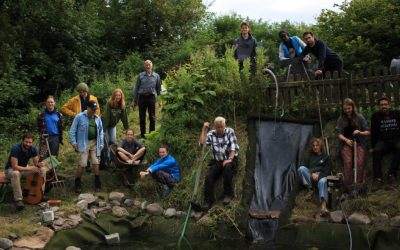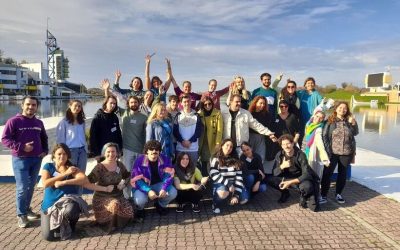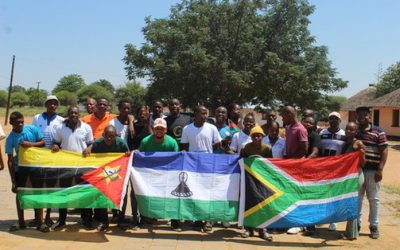The International Human Rights Day observed by SCI India
In co-operation with Human Wave (NGO)
The International Human Rights Day observed by SCI India West Bengal Group
Reported By Tapas Kumar Sur, 16th. December 2021
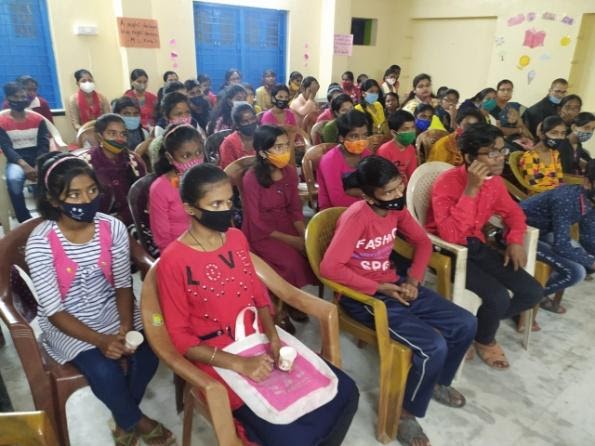
The secretary of SCI West Bengal group Tapas K Sur welcomed the participants – mostly teenagers and students, from economically weaker section. The workshop was conducted in vernacular, Bengali language.
First of all, the students were asked to explain how do they understand the word “Rights”? They replied that a right is what we deserve and asked if what we should get or receive is also our right. That is morally correct, just, is also called right. A moral or legal entitlement to have or do something is also called a right.
We observed that many words and terms used in this discussions – such as “we deserve”, “we should get” ‘Morally correct, just” “moral or legal entitlement” – are linked to our value systems or our conscience.
Another question we asked was: what do we need to have a happy and decent life? The students answered that if we can fulfill our physical needs, if we enjoy freedom of sharing our belief, if we can do what we believe in and if nobody forces us to accept what we don’t like then we can be happy.
About 3500 years back some enlightened people started preaching, promoting goodness and human skills to have a better life and thereby forming a better society. The Vedas around 3500 B.C., the Budha in 500 B.C., the Jesus 2100 years back, Muhammad about 1500 years back and other started to promote a developed set of values to have a better quality of life and society under the banners of different religions. They spoke about peace, friendship and happiness. From late 18th and 19th century monarchy and feudalism were being gradually replaced by welfare states as socialism and democracy were spreading out. Thus a new value system and a new social system came in to existence.
After the World War II, 50 nations joined together and started the United Nations Organization in 1945 in USA to prevent future war and promote peace and friendship among nations. The Universal Declaration of Human Rights was adopted by the General Assembly as UN Resolution on 10 December 1948 in Paris. Out of the 58 UN members at the time, 48 voted in favor, none against, eight abstained, and Honduras and Yemen failed to vote or abstain. In the present days, all of the 192 member states have signed and agreed to promote Human Rights in their own countries.
The students were asked, to whom should we claim our Rights? Eho should ensure that our rights are being protected? Their answers were clear – we have to claim our rights to our Governments. It’s a nation’s Government that is responsible for ensuring the rights of citizens.
So what rights should we claim? The students answered that to have a decent life we must have the right to work and earn our livelihood, we must have food, shelter and clothes. We must have freedom to share our thoughts and express our mind. Everybody must have equal opportunities and liberty to profess religion, political freedom. We should be afforded our Privacy, Dignity, there should not be any detention by the Government. The children must have accessibility to education and must be free from slavery. The press must have freedom.
Next, we read from a screen of an overhead projector, articles from 1 to 30 from the Universal Declaration of Human Right and discussed them.
Advocate Manash Bhattacharya also mentioned that we not only should be able to enjoy our rights, but we also have our corresponding responsibilities. We have to understand that my right should not outrage others’ liberty, like we should not post photos of children without clothes. We should not spread misleading information. If we do so we hurt the dignity of a child or disturb peace of mind by wrong information.
The participants were also informed about different rights protection mechanism of our Government. They learnt that in each district there are Protection Officers for children and women. In each police station, the second officer is responsible for child protection. There is a childline no.1098 for help. There is a women protection line no.1091. There is also a number for domestic violence and women safety in West Bengal no. o332359 5610.
Human Rights are protected by law from the municipal or local Government level to international level.
Sometimes due to ignorance of the people about their rights, the Govt. or ruling political parties are purchasing rights of the people offering them little advantages.
Advocate Manash Bhattachary said though we should have the aforesaid rights but in reality we don’t enjoy those Rights. There are huge inequalities in our society. There are people suffering from hunger and poverty. There is fear in our society; people cannot express themselves freely. The poor still cannot avail justice against rich. Thus Human Rights are violated every moment somewhere in the world.
Still we have to go a long way forward to improve the Human Right situation in India. We need to have political good will, legal infrastructure and above all – people’s participation to improve the situation.
The occasion was very lively as the students could identify incidents of human rights violations around them.
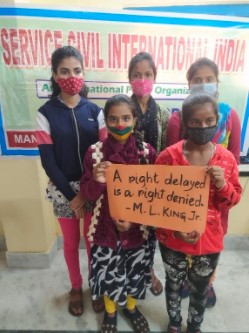
Explore more news
ESC Workcamp Coordination from June to September 2024 in Germany!
Would you like to fill your summer with meaning and unique encounters? Then apply now and coordinate three workcamps from June to September in Germany! 🌞 With support by the European Solidarity Fund (ESC) SCI Germany is able to offer two European volunteers the opportunity to coordinate three workcamps in Germany with full accommodation and pocket money included! 🤝 The workcamps you are going to...
Call for Participants – Training Course on well-being in Poland
Call for youth workers, volunteers and NGO activists living in Bulgaria , Germany , Hungary , Ireland , Italy , North Macedonia , Poland , Portugal , Slovenia and Spain! SCI Poland has a great opportunity for you to join a free 7-day training course! This training will help you master your emotional and social intelligence so that you can increase your well-being and plan a better, happier life!...
Southern Africa Workcamps Cooperation
The Southern Africa Workcamps Cooperation was held from the 29th February to the 3rd March 2024 in Botswana, under the theme ‘Promotion of South-South Cooperation’ and hosted by the Botswana Workcamps Association In an endeavor to enhance self reliance, collaboration and the attainment of internationally agreed development goals (SDGs), Southern African Countries (Botswana, South Africa,...

